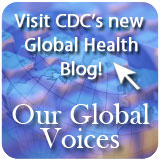CDC: Protecting Americans Through Global Health - Kenya
CDC works 24/7 to protect the American people from disease, including those that begin overseas. CDC has dedicated and caring experts in over 50 countries. They detect and control outbreaks at their source, saving lives and reducing healthcare costs.
Transcript
WOMAN: The Centers for Disease Control and Prevention, CDC, works 24/7 to protect the American people from disease, including those that begin overseas. CDC has dedicated and caring experts in over 50 countries. They detect and control outbreaks at their source, saving lives and reducing healthcare costs. In 2011, CDC responded to almost 250 outbreaks and emergencies in 20 countries, preventing disease spread to the U.S. One of CDC's Global Disease Detection Centers is in Nairobi, Kenya. DR. BREIMAN: Kibera is just one of many slums in Nairobi. More than 60% of people in Nairobi live in informal settlements like Kibera or even worse than Kibera in terms of population density and sanitation and hygiene. People that live here often work all over Nairobi. So, the diseases that pop up here and spread rapidly to other parts of Nairobi -- it's easy for those diseases to move through airplanes and other methods to anywhere else in the world, all within just a few hours. WOMAN #2: [ Speaking Swahili ] WOMAN: CDC carefully monitors diseases in Kibera. Using palm-held devices, local staff visit families every two weeks to record instances of disease. WOMAN #2: [ Speaking Swahili ] WOMAN: They recommend that people who are ill go to the state-of-the-art clinic built with U.S. private donations and CDC guidance. The Kibera clinic uses electronic records to monitor patients and track the spread of disease. Its labs rapidly test for bugs that cause sickness and disabilities. [ Device beeping ] In another clinic across town, CDC works with Coptic Hospital to combat the AIDS epidemic, Kenya's most deadly killer. Coptic and CDC provide life-saving care to kids with HIV and their families, preventing the spread of HIV to the next generation. DR. WARUI: [ Speaking Swahili ] WOMAN: Coptic is one of CDC's faith-based partners. Here in 2011, more than 4,000 consultations with HIV-infected children provided life-saving care. Over 200 mothers received medicine to prevent transmitting HIV to their babies. Working with Kenyans, CDC saves lives while controlling the spread of diseases at their source.
Get email updates
To receive email updates about the Global Health site, enter your email address:



